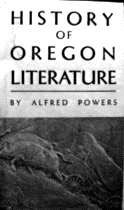By Walt Curtis © 1995
Alfred Powers was an educator, author, scholar and historian. Called Dean Powers in the '50s, Alfred taught writing at Portland State University and influenced many of the state's journalists and writers.
 At the University of Oregon, the history bug bit him. In 1935, he published
the History of Oregon Literature. The 800-page compendium is fun
to read and can be found in many local libraries. Powers did a good job of
covering the Oregon Territory including Indian myths, Chinook jargon, missionary
prayers, trappers' accounts and pioneer diaries. I wish it were back in print! A
solid reference work.
At the University of Oregon, the history bug bit him. In 1935, he published
the History of Oregon Literature. The 800-page compendium is fun
to read and can be found in many local libraries. Powers did a good job of
covering the Oregon Territory including Indian myths, Chinook jargon, missionary
prayers, trappers' accounts and pioneer diaries. I wish it were back in print! A
solid reference work.
Powers was also the main editor for Metropolitan Press of Binford & Mort . He edited Genevieve by Balch. He also wrote fine juvenile fiction: A Long Way To Frisco, Hannibals Elephants and my favorite; Marooned In Crater Lake. The OSU Press ought to reprint this classic!
Lake Oswego poet Penny Avila interviewed Powers in his 95th year and asked "Does Oregon have a special climate, elixir, that causes people to be creative with words?" A genuine Webfoot, Powers replied: "I've never been able to analyze it. Whether it's a mixture of sunshine and gloom, whether it's the gorgeousness of our herbage - the riotous show of nature which really is a product of the rain - some kind of germ exists here in Oregon that leads to the creative kind of thing."
"I have never been convinced that there is any expression in the world that can equal the expression of poetry...It is the utmost reach of human expression."
From Power's History of Oregon Literature:
There is a stone obelisk on Memaloose Island, which can be seen
from the freeway. Whose grave is it? A white man named Victor Trevitt, who had
lived in The Dalles, died in San Franciso. He told his friends:
"I have
but one desire after I die, to be laid away on Memaloose Island with the
Indians. They are more honest than whites and live up to the light they have.
In the resurrection I will take my chances with the Indians."
Chinook jargon:
- Whiskey mimoluse tillikums
- Pe alta nika mash!
- "Whiskey kills people,
- And now I throw it away."
Salem for pride;
If it hadn't been for salmon,
Oregon City would have died."
A poem from an early visitor to Oregon, James Clyman:
An Address to Mount Hood
what brot you forth to ethereal light
From Earth's inmost deepest womb
Was central earth so Jamd so pent
That thou arose to give it vent
Or for some other purpose sent
A Monumental Tomb
The Earth had flowed a burning sheet
Of melted wavering fire
That animation Flaming lay
A molten Mixed was rocks and clay
When thou a bubble rose to play
Above the funeral pyre.
Marooned in Crater Lake, published by Metropolitan Press in 1930, is a beautiful collection of stories from the Oregon outdoors. It contains tales of the Blue Bucket Mine and Umpqua Indians. The lead adventure is as good as Jack London's work. The boy, Jim, is stranded in the caldera of Crater Lake. How will he escape? The boy had 24, 1-cent stamps with Benjamin Franklin's face on them. They'd save his life. Check out your local library for a copy (it's out of print). Both kids and adults would love it.










